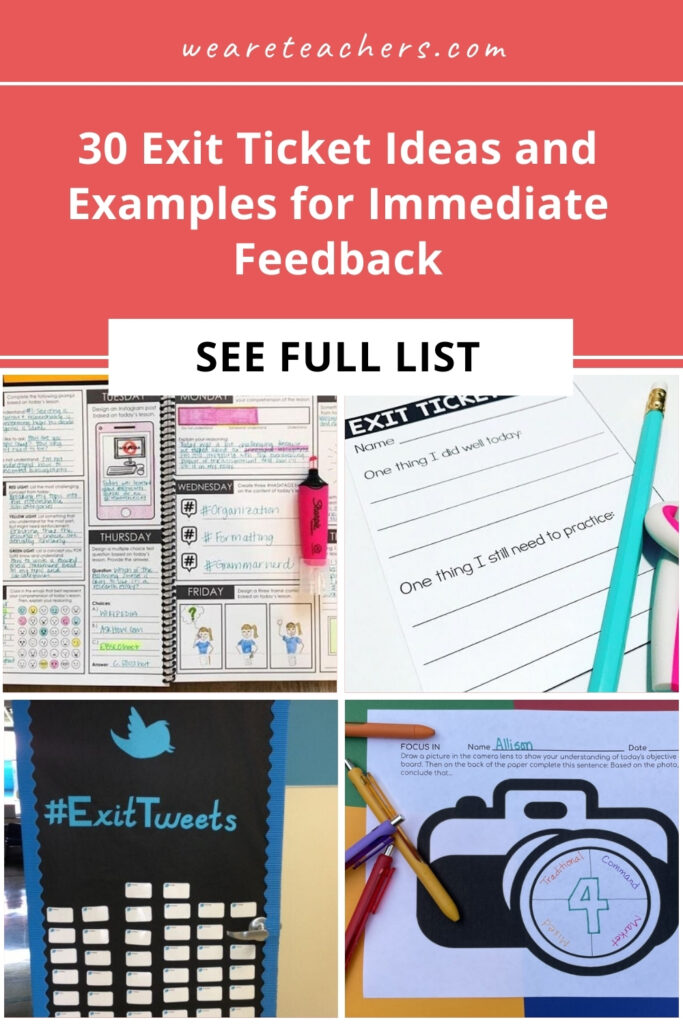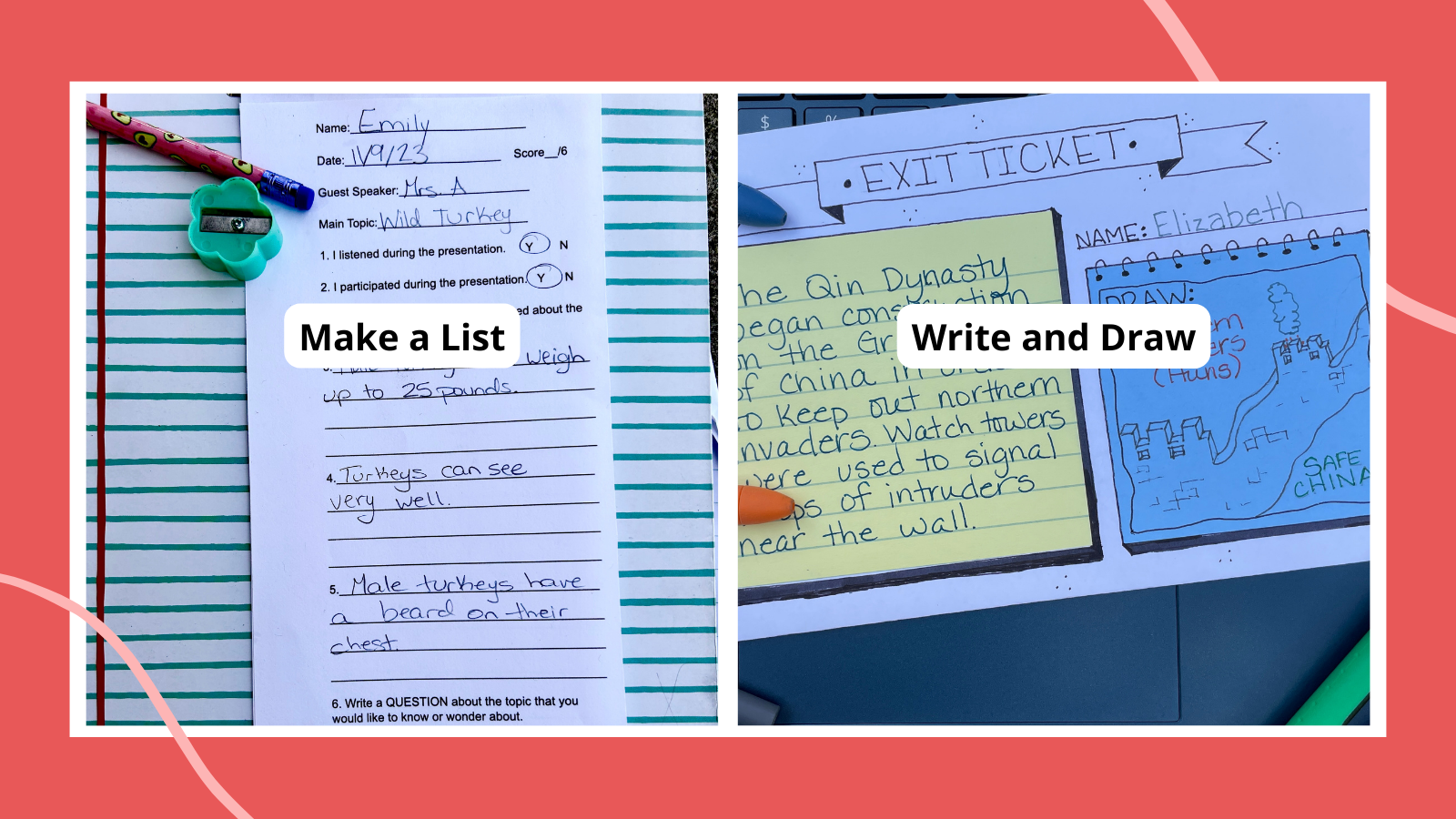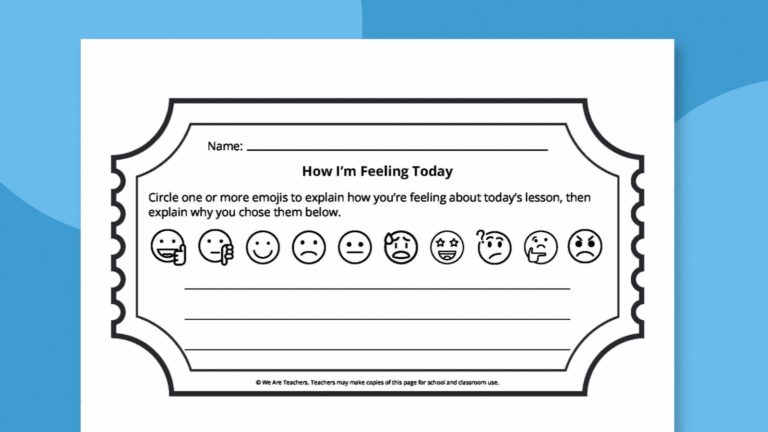Experienced teachers know that a good classroom is more about a back-and-forth, give-and-take model than just “teacher talks, students listen.” Students are most successful when teachers are constantly assessing their progress and adjusting instruction. Exit tickets are one terrific way to get immediate feedback on the lesson at hand. They work in every classroom at every level, and in virtual classrooms too. Here, we cover the basics of Exit Tickets 101, followed by our favorite ways to put them into practice.
What is an exit ticket?
Exit tickets are responses written by students to questions posed by teachers at the end of a class or lesson. These quick, informal assessments help teachers quickly assess their students’ understanding of the material. In addition, exit tickets are an excellent source for targeted feedback about students’ experiences in your class.
What are the benefits of exit tickets?
Exit tickets are a veritable gold mine of information, both for your students and for you. They can help reveal which of your students have a concept down, who is almost there, and who is pretty much totally lost. Or, worst case, they can show if there are any sweeping misconceptions that need to be cleared up. This valuable information allows you to differentiate your instruction and revisit lessons with the whole class, small groups, or individually.
Exit tickets facilitate better communication between teacher and students, giving quiet or shy students the opportunity to express themselves without having to raise their hand and potentially freeze. They also allow students to ask for help privately. In short, exit tickets increase students’ participation in the process and send the message that students’ thinking is valued.
In addition to grasping the academic topic at hand, exit tickets can help you gauge how your students are feeling about their learning, which helps them build valuable metacognition skills. They can also provide valuable insight into how students perceive the learning environment in your classroom and if their needs are being met.
How do I create effective exit tickets?
While exit tickets are not a hard-to-master art form, crafting effective ones does take practice. Here are a few tips to keep in mind:
- Ensure exit tickets align with lesson objectives: Exit tickets should relate directly to the lesson’s learning intentions and success criteria.
- Make the intention clear: Exit tickets should precisely reflect what you want to learn about students’ understanding.
- Keep it quick and easy: Students should be able to complete the exit ticket in five minutes or less. In addition, the process should be simple, with clear instructions on what to do with the exit ticket when they are finished.
- Offer variety: Employ different methods of questioning. Use multiple choice, short answer, or a handful of questions. Offer both closed- and open-ended options: Ask students to summarize what they’ve learned in their own words.
- Use your imagination: Creative exit tickets can help students engage and think outside the box.
Exit Ticket Ideas and Examples
1. Ask, “What stuck with you today?”
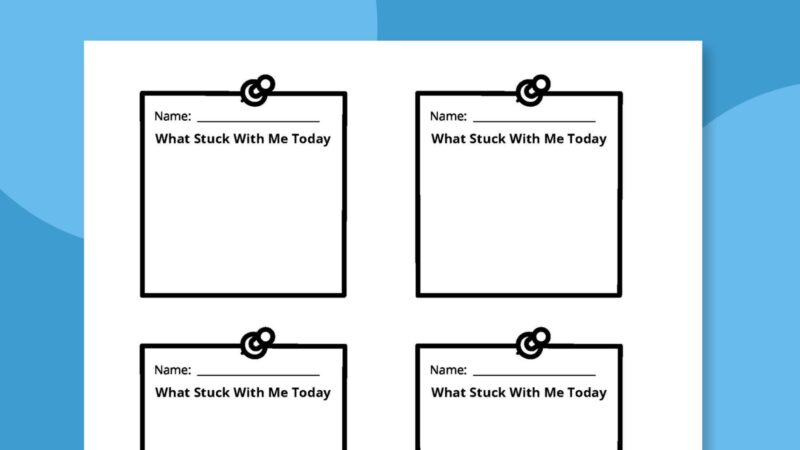
Find out what made the most impact with one simple question. Sticky notes are fantastic for exit tickets; just have each student post theirs to the board on their way out the door.
Try it: Free “What Stuck With Me Today” Exit Ticket Printable
Plus, did you know you can easily print on sticky notes? This game changer means you can easily customize exit tickets for any topic.
2. Check in while it’s fresh on their minds
There’s no need to wait until the end of the day to check in, especially in elementary classrooms. Try using exit tickets before lunch or recess. Kids too young to write? Have them tell you their answer verbally on their way out the door.
3. Do a brain dump
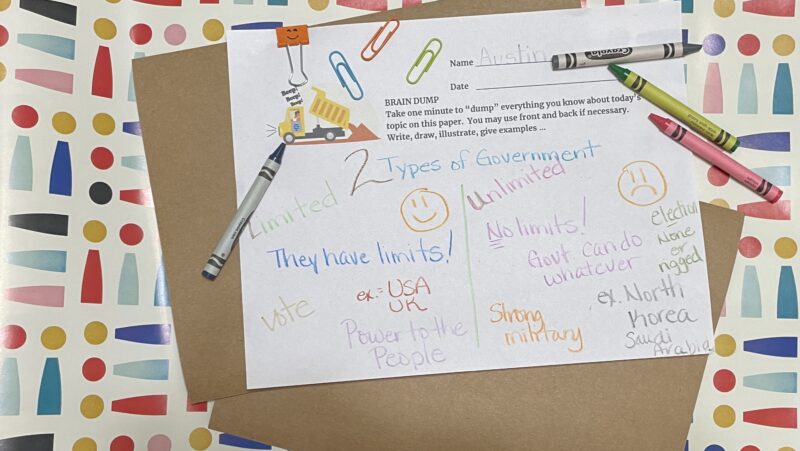
Sometimes after a lesson, there are so many concepts and words swimming around in students’ minds, it’s good to give them an opportunity to write it all down. These exit tickets are also a good way to see how many concepts students picked up on.
4. Gauge understanding with emojis
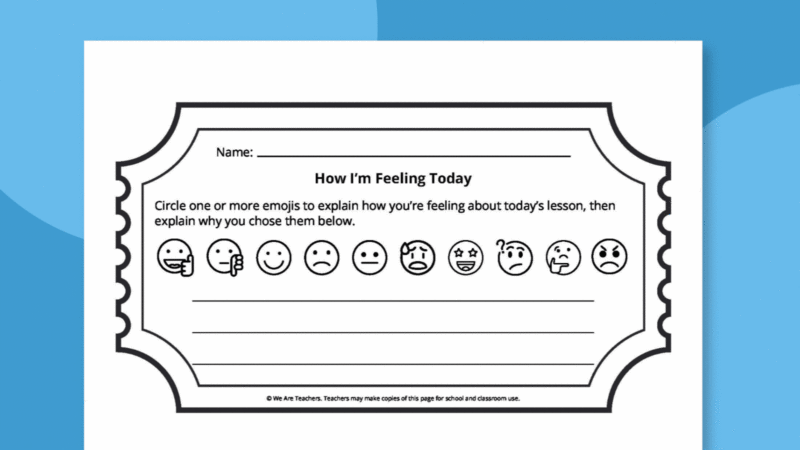
Here’s another way to help today’s kids connect and share their progress. Have them circle an emoji on this free printable to show how they’re feeling and explain why that emoji reflects their understanding. You can also use this one for morning meetings or social-emotional check-ins.
Try it: Free Emoji Exit Ticket Printable
5. Record a video
Have kids record video answers to a question posted by their teacher. This is such a cool exit ticket idea for virtual classrooms, though it works in face-to-face classrooms too.
6. Draw a response
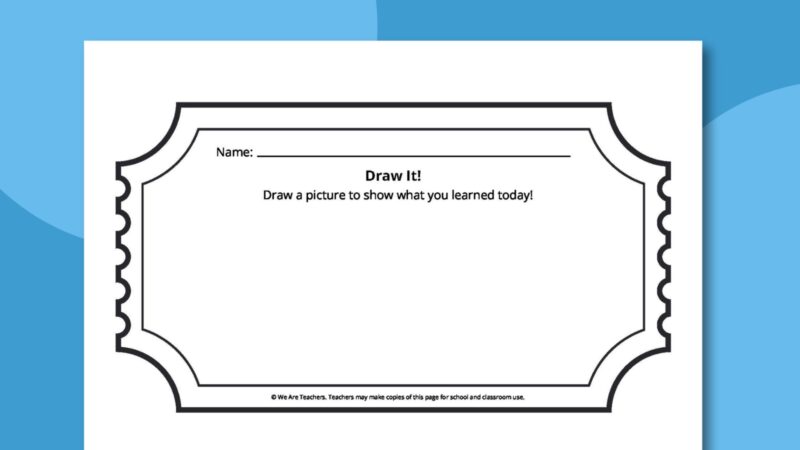
Mix things up by having students draw instead of write. Ask them to illustrate the main idea, key ideas, how they’re feeling, and more. This one really allows you to be creative and can be used with any age group.
Try it: Free “Draw It!” Exit Ticket Printable
7. Write and draw
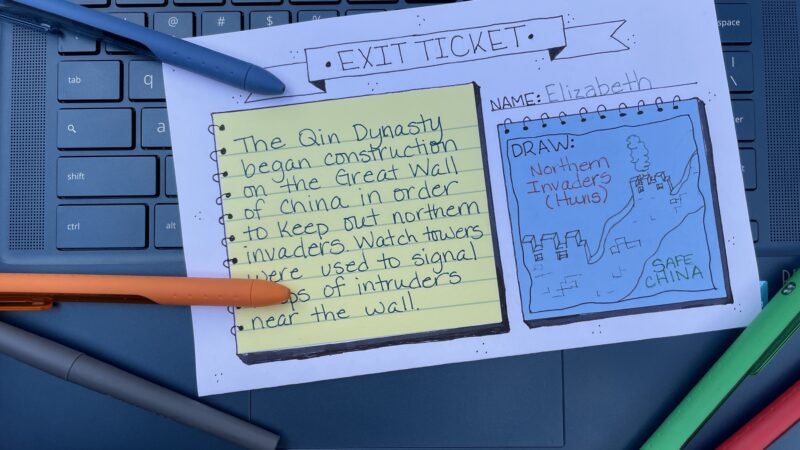
Give students space to use all the tools available to them with this combo write-draw exit ticket.
8. Post a traffic light to collect exit tickets
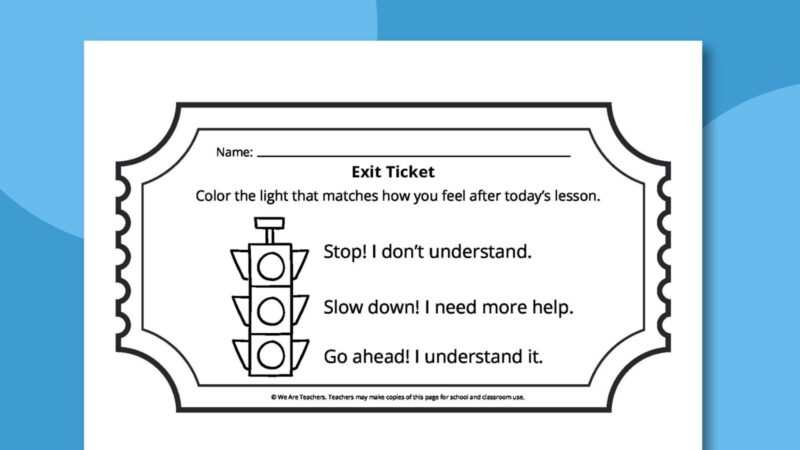
This exit ticket is awesome to use with students who haven’t quite mastered reading and writing. Have students color in the traffic light color that matches how they feel. (Red = Help, I’m lost!, Yellow = Almost there, Green = Got it!). Their responses help you focus on those who need more help first.
Try it: Free Traffic Light Exit Ticket Printable
9. Focus in on the most important thing
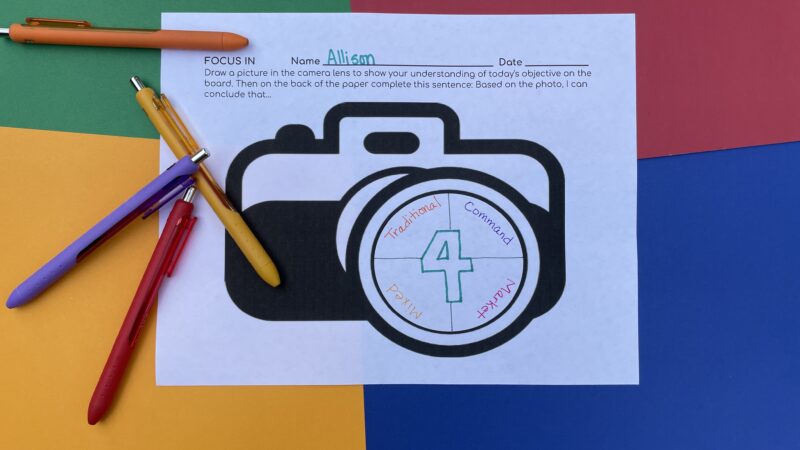
This creative exit ticket allows you to measure how accurate your lesson objective was by asking students to zero in on the main takeaway. On the front, they draw a picture and on the back they write a conclusion based on their drawing.
10. Give them prompts to choose from
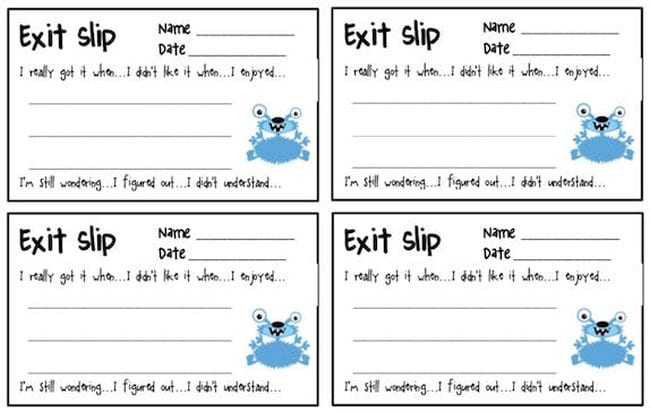
Sometimes exit tickets are very specific, but other times you just want to know what students’ general reaction was to the class that day. We like this simple option that offers a few prompts to get them started.
Try it: Exit Slips With Prompts
11. Assess learning during presentations
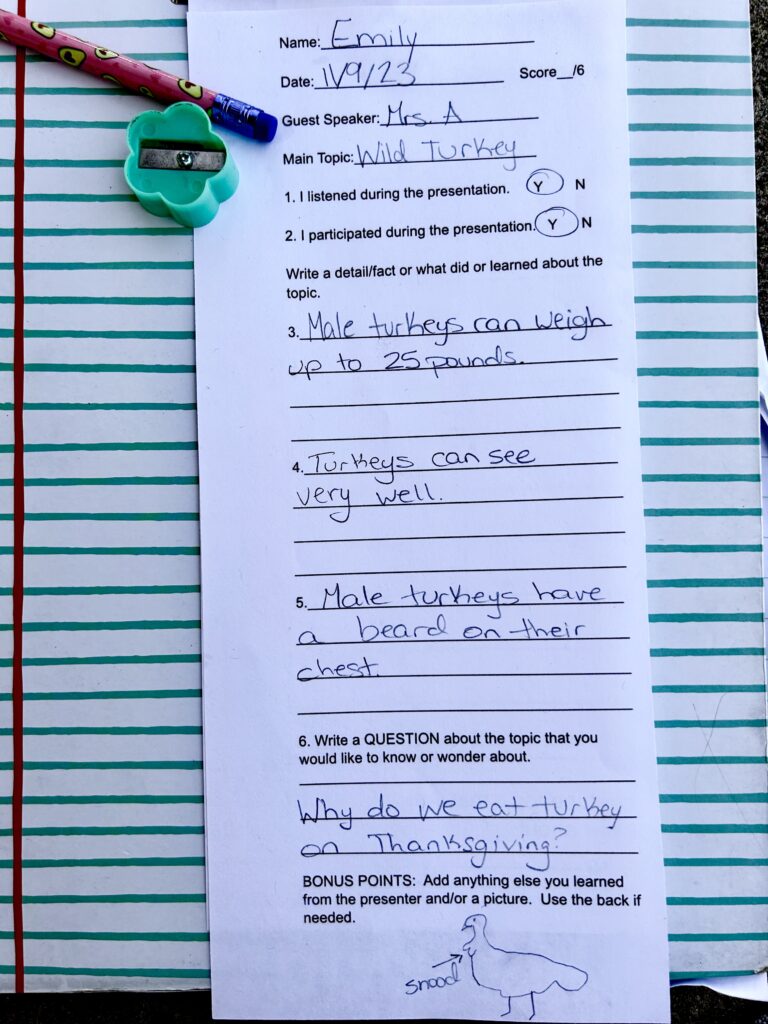
Sometimes when you have a guest speaker or watch a video, kids can check out. Make sure students pay attention and participate with this clever exit ticket. First, they rate their participation. Then, they list three important facts followed by a question.
12. Use the “Post-It, Prove It” method of exit tickets
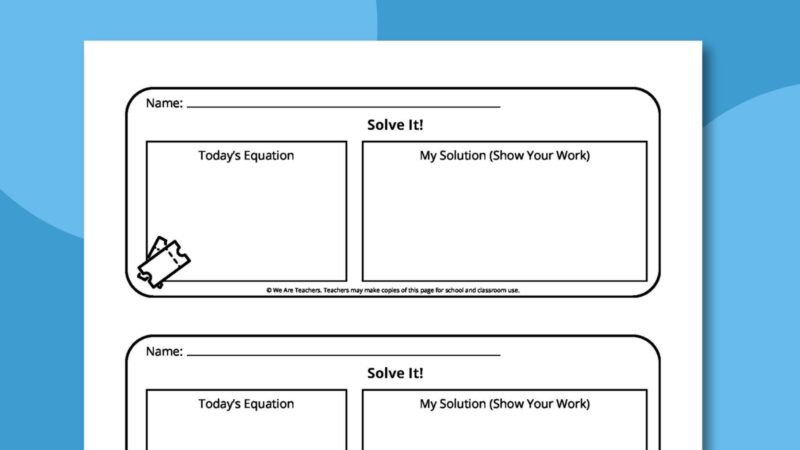
Here’s an example of a more specific exit question. After a math or science lesson, give students one last question or equation. Students will solve and then show their work so you can assess their understanding accurately.
Try: Free “Solve It!” Exit Ticket Printable
13. Let your students weigh in
Kids often surprise us by looking at things in entirely different ways but still getting the correct answers. Their thoughts on a subject may provide ideas for helping other students who need a bit more instruction. At the end of the lesson, have students write down one tip that might help another student who is struggling with the objective.
14. List three important things
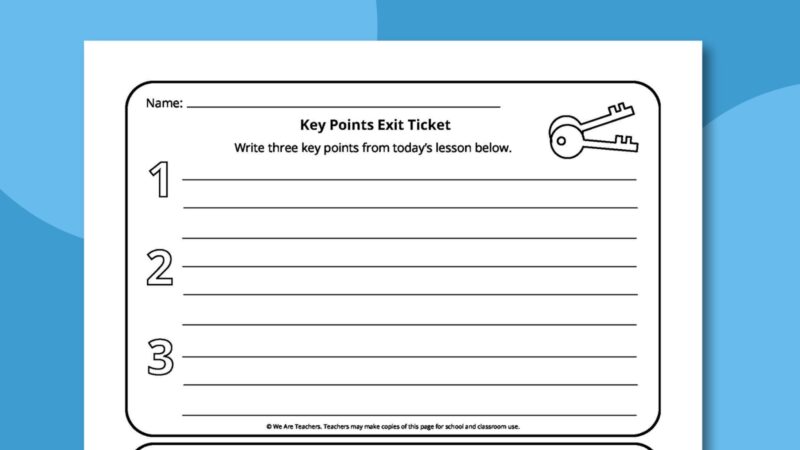
This exit ticket is short and simple but very effective. Ensure students truly understood the main ideas of your lesson by asking them to write three key points before they go.
Try it: Free Key Points Exit Ticket Printable
15. Sum it up with one sentence
Help your students distill what the day’s lesson was all about with a one-sentence summary. This requires students to prioritize the most important elements of the activity and reveals whether they are getting the “big picture.”
16. Thumbs Up/Thumbs Down
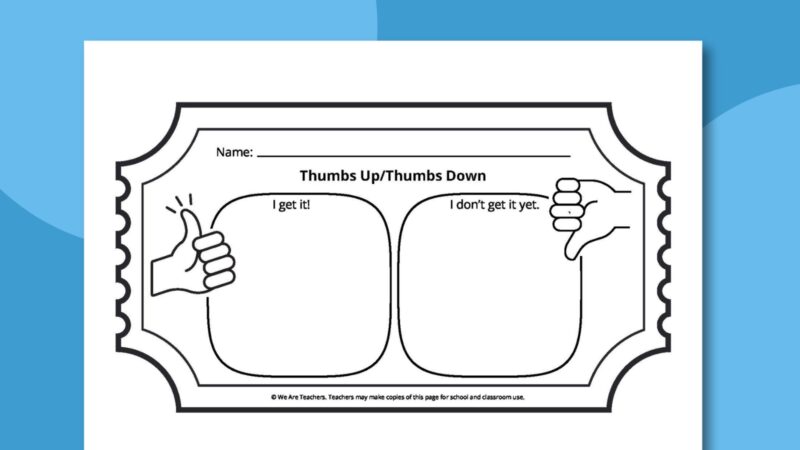
Sometimes you look out at your students and you see a lot of blank stares. When this happens, take a quick moment to use this exit slip. It will help you assess who’s on board and who needs further instruction.
Try it: Free Thumbs Up, Thumbs Down Exit Ticket Printable
17. Take a poll
Online polls make terrific exit tickets. Poll Everywhere is free to use, and kids can text their answers. Fun!
18. Encourage self-reflection
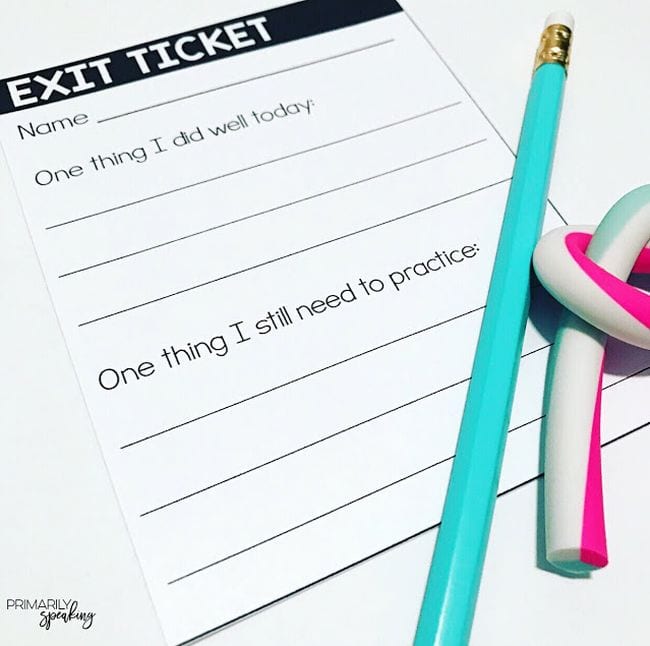
Valuable as they are to teachers, exit tickets are also important for helping students self-assess. This version lets them reflect on their strengths and areas for improvement.
Try it: Reflection Exit Tickets
19. Tell two facts and a fib
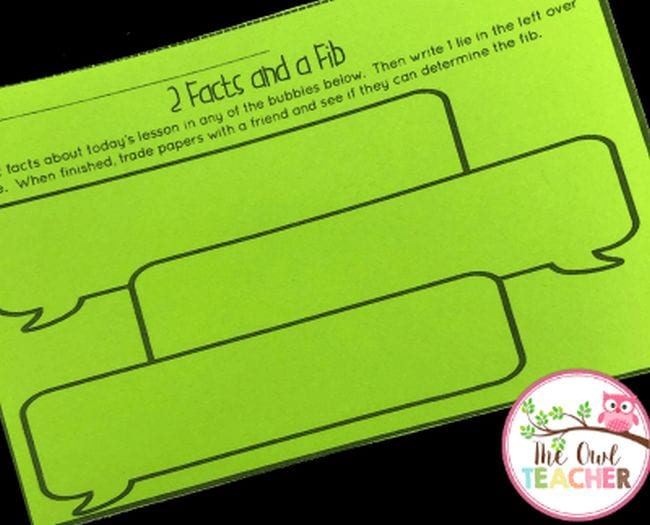
We love this interactive ticket idea! Kids write down two facts about today’s subject and one fib. They trade with another student to see if they can guess the incorrect fact before turning them in.
Try it: Two Facts and a Fib
20. Keep an exit ticket journal
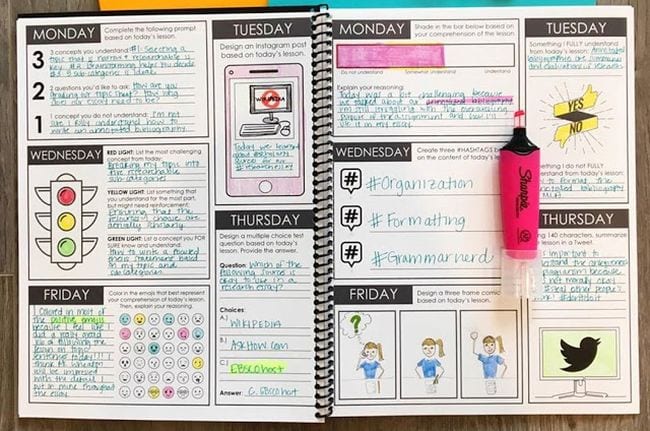
Give exit tickets a bit more substance by having students keep them in a journal. This gives them a nice record of learning and can help when it comes time to review for tests or write a paper.
Try it: Exit Ticket Planner
21. Post exit tickets on Padlet
Think of Padlet as an online bulletin board. Teachers post a question or topic, and kids add their answers. See our review of Padlet here, then give it a try.
22. Make a 3, 2, 1 list
The 3, 2, 1 method allows kids to self-assess, but it also lets them indicate a deeper level of interest in the topic at hand. Plus, it helps you, as the teacher, to get an accurate overview of how your students are doing. To make their list, ask students to write down three things they learned or worked on today, two things they’re still working on, and one question they have.
23. Make it a mini-assessment
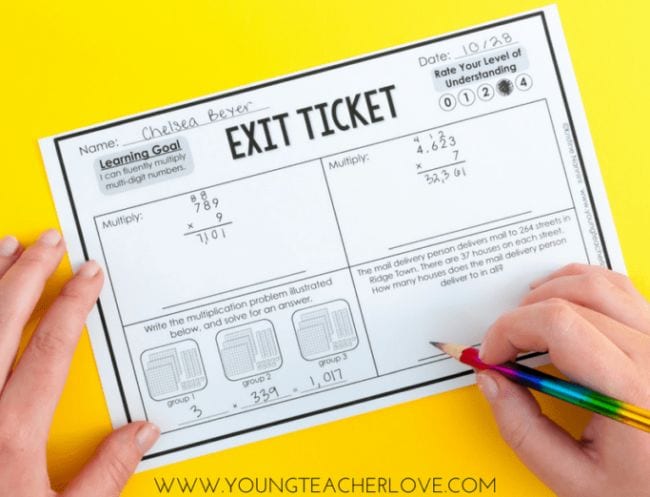
You’ll have to prep these in advance, but an assessment exit ticket is sort of like a no-stress quiz. Kids simply do their best, without worrying about grades, and you get a better feel for their progress.
Try it: Editable Assessment Exit Ticket
24. Fill up a shopping cart
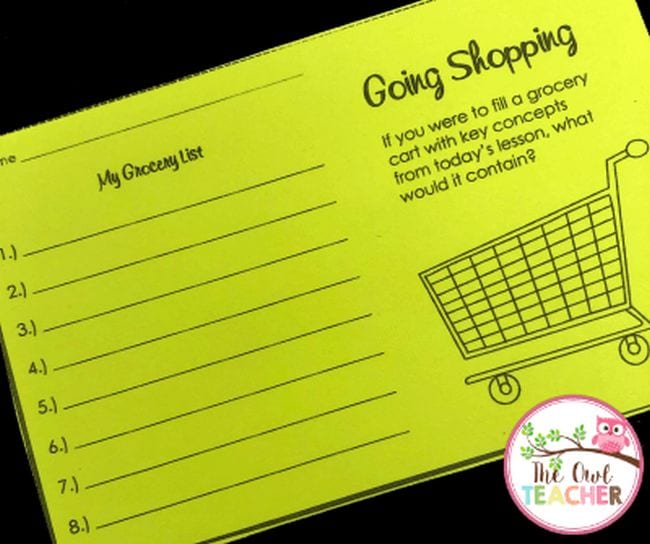
Here’s a chance to really see what students’ takeaways were from a lesson. This will let you see if your learning objectives are coming through as they should.
Try it: Shopping Cart Exit Ticket
25. Follow science lab with exit tickets
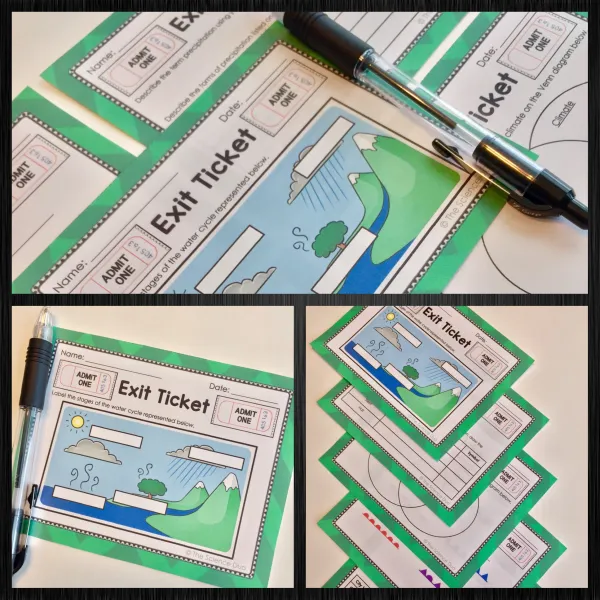
Hands-on science exploration should be followed up with written observations and conclusions. Use exit tickets that are like mini quizzes to check for understanding.
Try it: Science Lab Exit Ticket
26. Change it up
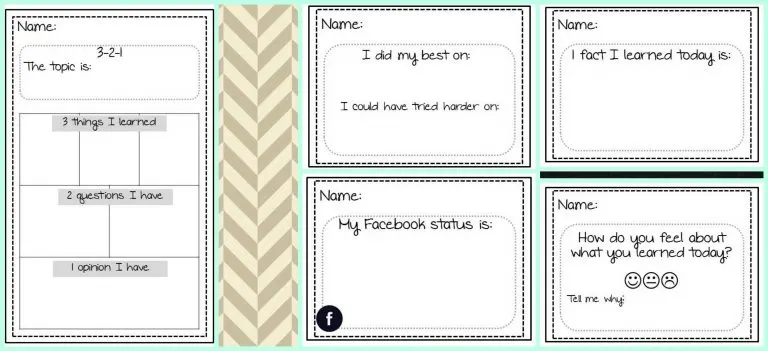
If you always use the same exit tickets after a lesson, your students might go on autopilot. Change up your format by asking students how they’re doing in a variety of ways. Start with any of the ideas here.
Try it: Editable Exit Tickets
27. Match your exit tickets with your teaching philosophy
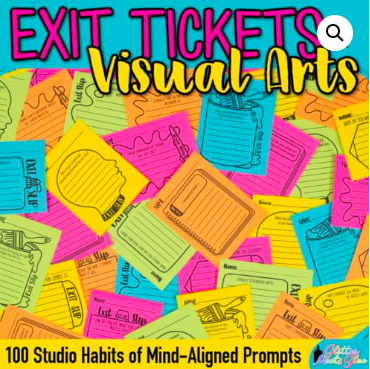
These colorful prompts were developed to align with the Habits of Mind framework. Choose from questions that encourage your students to observe, reflect, and explore what they’re learning.
Try it: Habits of Mind Exit Tickets
28. Collect answers on Google Forms
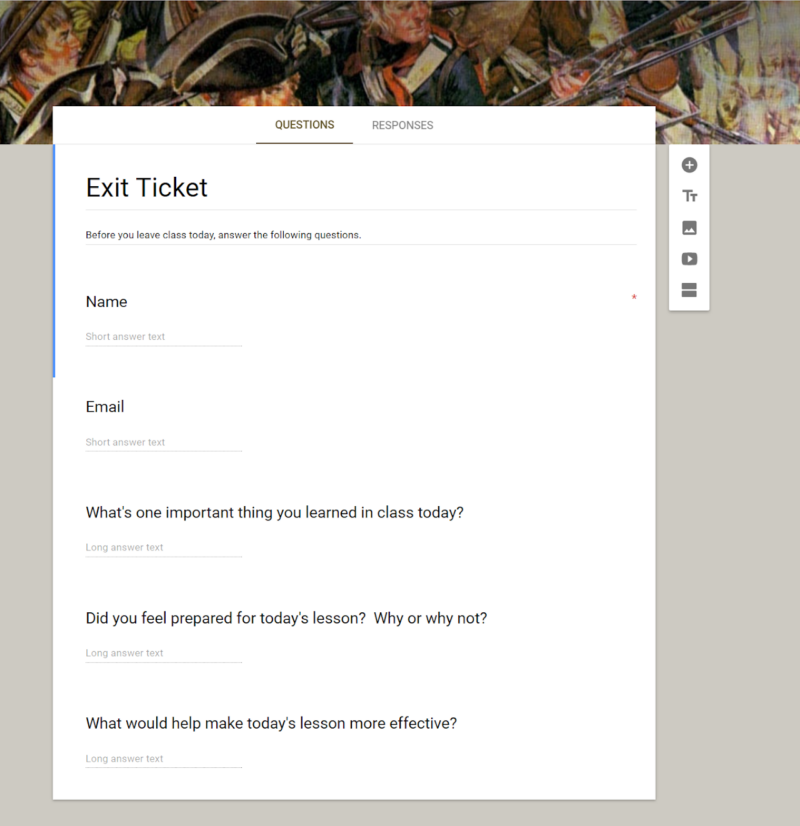
Teaching online or looking to save paper? Collect your tickets using Google Forms instead. This is especially useful if you’re already using Google Classroom.
Try it: Google Classroom Exit Tickets
29. Have them “tweet” it

This cute “Twitter” board is sure to appeal to young social media fans. Laminate the cards so they can be reused each day.
30. Finally, take time to analyze exit tickets
Make sure your exit tickets are worth the effort. Spend a little time at the end of each class or day looking over student responses, and make notes about any needs they indicate. A few ways you can use the information you get from exit tickets include: revisiting the lesson to address sticking points with the whole class, forming a small group for those who still need help while allowing others to move on, and meeting individually with students who need extra help.
Exit tickets are just one type of formative assessment. Check out our guide to formative assessment.
Plus, download our Free Exit Ticket Templates.
